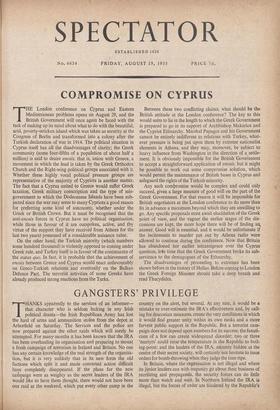COMPROMISE ON CYPRUS
THE London conference on Cyprus and Eastern Mediterranean problems opens on August 29, and the British Government will' once again be faced with the task of making up its mind about what to do with the beautiful, arid, poverty-stricken island which was taken as security at the Congress of Berlin and transformed into a colony after the Turkish declaration of war in 1914. The political situation in Cyprus itself has all the disadvantages of clarity; the Greek community (some four-fifths of a population of about half a million) is said to desire enosis, that is, union with Greece,. a movement in which the lead is taken by the Greek Orthodox Church and the Right-wing political groups associated with it. Whether these highly vocal political pressure groups are representative of the majority of Cypriots is another matter. The fact that a Cyprus united to Greece would suffer Greek taxation, Greek military conscription and the type of mis- government to which the Dodecanese Islands have been sub- jected since the war may seem to many Cypriots a good reason for preferring some kind of autonomy, whether under the Greek or British Crown. But it must be recognised that the anti-enosis forces in Cyprus have no political organisation, while those in favour of it are outspoken, active, and (by virtue of the support they have received from Athens for the last two years) possessed of a considerable nuisance value.
On the other hand; the Turkish minority (which numbers some hundred thousand) is violently opposed to coming under Greek rule, and Turkey itself is in favour of the continuance of the status quo. In fact, it is probable that the achievement of enosis between Greece and Cyprus would react unfavourably on Greco-Turkish relations and eventually on the Balkan Defence Pact. The terrorist activities of some Greeks have already produced strong reactions from the Turks. Between these two conflicting claims, what should be the British attitude at the London conference? The key to this would seem to lie in the length to which the Greek Government is prepared to go in its support of Archbishop Makarios and the Cypriot Ethnarchy. Marshal Papagos and his Government cannot be entirely indifferent to relations with Turkey, what- ever pressure is being put upon them by extreme nationalist elements in Athens, and they may, moreover, be subject to heavy influence from Washington in the direction of a, settle- ment. It is obviously impossible for the British Government to accept a straightforward application of enosis, but it might be possible to work out some compromise solution, which would permit the maintenance of British bases in Cyprus and safeguard the rights of the Turkish minority.
Any such compromise would be complex and could only succeed, given a large measure of good will on the part of the Greek Government. For that reason it will be impossible for British negotiators at the London conference to do more than fix in advance a maximum beyond which they are unwilling to go. Any specific proposals must await elucidation of the Greek point of view, and the vaguer the earlier stages of the dis- cussions are kept, the more hope there will be of finding an, answer. Good will is essential, and it would be unfortunate if the incitements to murder put out by Athens radio were allowed to continue during the conference. Now that Britain has abandoned her earlier intransigence over the Cyprus question, ails time that the Greek Government broke its sub- servience to the demagogues of the Ethnarchy.
The disadvantages of proceeding to extremes has been shown before in the history of Hellas. Before coining to London the Greek Foreign Minister should take a deep breath and read Thucydides.


































 Previous page
Previous page